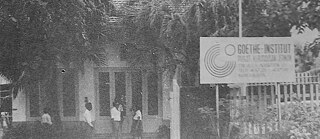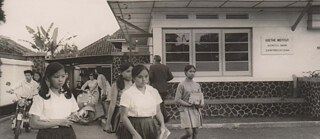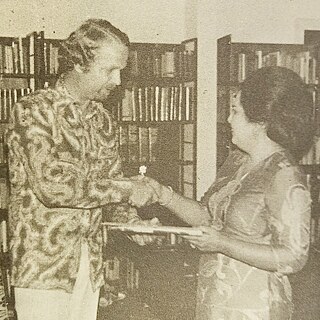© Archive - Goethe-Institut Indonesien
© Archive - Goethe-Institut Indonesien
© Archive - Goethe-Institut Indonesien
1964
The beginning of Goethe-Institut Surabaya
Opening
The Goethe-Institut Surabaya began in the 1960s when the renowned gamelan music expert Dr. Rudolf Gramich and other teachers offered German courses in Surabaya. The great success of these courses caught the attention of the Goethe-Institut, which opened an office in Surabaya in 1964.
Due to political turbulence, the management was brought back to Germany, but the institute remained. Not long after, the Goethe-Institut's language courses became so popular that in 1966 about a thousand people came to the institute to sign up for a course. The situation only settled down when the police came to disperse the crowd.
© Archive - Goethe-Institut Indonesien
1967
Initiative of the Goethe-Institut
Deutsche Tanzer performs in Indonesia
Deutsche Tanzer consisted of 10 dancers selected from well-known ballet companies from various cities in West Germany. Through the initiative of the Goethe-Institut, they joined forces under the name Deutsche Tanzer to tour Asian countries. In Indonesia, this group performed in Jakarta and Surabaya. They danced classical, modern, and jazz ballet works. Initially, only one performance was planned in Jakarta, but due to high demand, another was added. Performances took place twice on the night of Monday, 27 and Wednesday, 29 November 1967 in the H.I. Bali Room.
© Archive - Goethe-Institut Indonesien
1969
Goethe-Institut Surabaya and Bandung
-

The Goethe-Institut Surabaya moves its location to Jl. Taman AIS Nasution 15. The German Embassy in Jakarta provided the site as a new language and culture centre in Surabaya. © Archive - Goethe-Institut Indonesien -

The Goethe-Institut Bandung commences operations as a branch of the Goethe-Institut Jakarta. In June of the same year, the institute moved into the former home of Dutchman Paul Jüttner. This building previously housed the German School Bandung. © Archive - Goethe-Institut Indonesien
© Archive - Goethe-Institut Indonesien
© Archive - Goethe-Institut Indonesien
© Archive - Goethe-Institut Indonesien
© Bert Verhoeff / Anefo / CC0 1.0 Universal Public Domain Dedication
1975
Match replay
The 1974 World Cup
The Goethe-Institut hosts an event for the public to watch the 1974 World Cup using a film tape. This took place in January, five months after the football event in West Germany. Back then, hosts West Germany became world champions after beating the Netherlands 2-1 in Munich's Olympic Stadium.
© Archive - Goethe-Institut Indonesien
